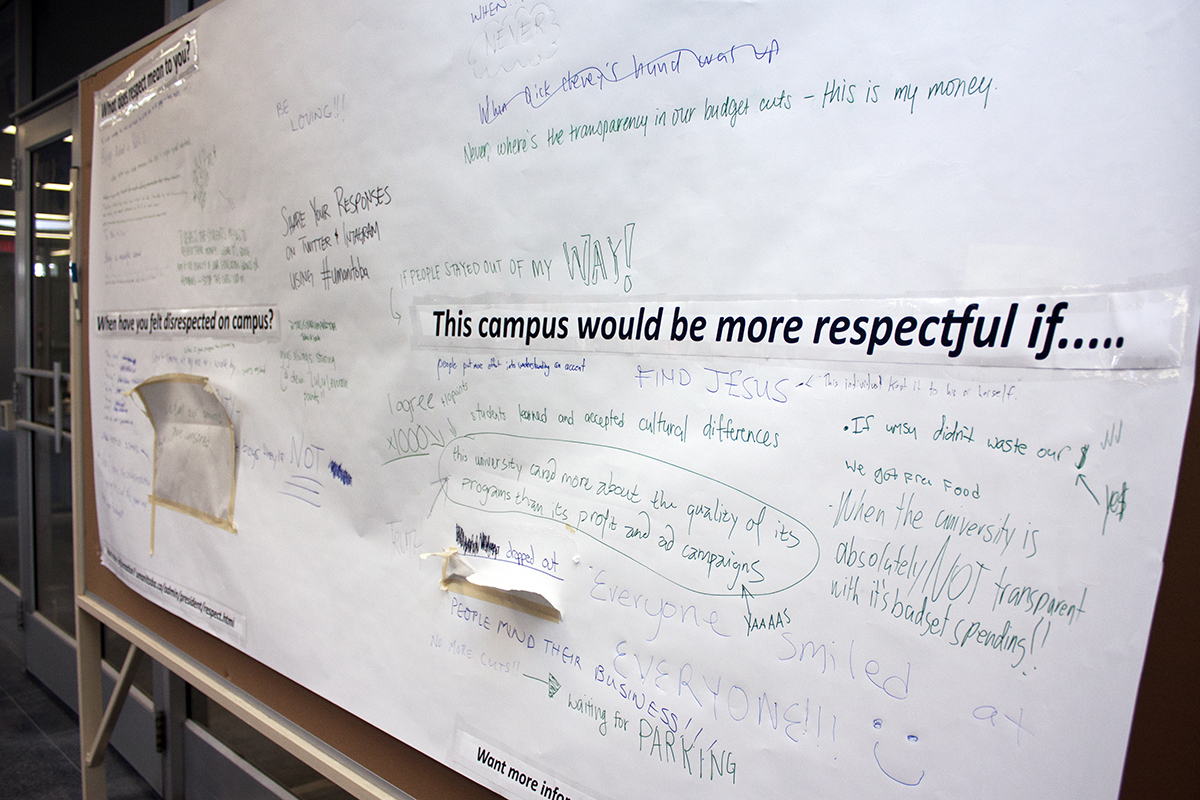Aside from some inappropriate posts, including racist and sexist remarks directed at Nigerian women, the university’s “Scrawl on the Wall” initiative garnered mostly positive attention last week. The initiative was meant to garner responses from the University of Manitoba community on how to live, study, and work in a respectful environment.
Students, faculty, and staff were invited to publicly post their ideas and comments about respect and integrity as part of the poster campaign.
Located at 20 locations across the university’s three campuses from March 16-20, the posters posed four questions to passersby: “what does respect mean to you?”; “when have you felt respected on campus?”; “when have you felt disrespected on campus?”; and “this campus would be more respectful if,” followed by space to fill in the blank.
One of those anonymous comments scrawled on the wall, filling in the blank, read, “When Nigerian girls start wearing decent clothes” followed by “#forGodssake.”
This was not an isolated incident. A similar post directed at Nigerian women was reported on at least one other poster in University Centre.
University of Manitoba Nigerian Students’ Association president Oyindamola O. Alaka was unaware of the comment up until the matter was brought to her attention by the Manitoban.
“This is a very disrespectful and racist comment; it is part of a bigger problem in [the] world, an issue of feminism, racism and double standards,” said Alaka in a statement to the Manitoban.
“We need to have more discussion about respect in society.”
Although some of the comments found on posters were disrespectful, administrators had braced for unwelcomed remarks, ensuring security response procedures were in place.
“We anticipated that this would occur to some extent,” Jackie Gruber, the university’s human rights and conflict management officer, told the Manitoban in an email.
“Security Services [has] been extremely helpful in this project,” Gruber said.
“If there were inappropriate comments, they took a photo and emailed [the comments] to me directly, and then we would go to the location and cover up the comments.”
Various negative comments were covered up by administrators, using masking tape and paper to block the comments from view.
“I feel disappointed that some of our community members felt it was okay to write such comments, but it is not entirely unexpected. It would not be honest for us to suggest that problems ranging from disrespectful behaviour to outright racism do not exist on our campus,” Gruber said.
As she pointed out, censoring comments by hiding them out of sight did not mean they would be ignored by administration.
“In a sense, even those inappropriate comments have their use as evidence to inform our decisions on what we need to work on with the community,” she added.
Targeted task force
Posters are being collected from across campus, and responses reviewed by the committee over the upcoming week. However, the call for scrawl was not the university’s only plan for community consultation.
In her email, Gruber told the Manitoban that the university will be conducting focus groups with students to obtain more information about how to bolster their respectful work and learning environment policy and procedures.
The Respectful Work and Learning Environment policy guide is in place to ensure that individuals have the “right to participate, learn, and work in an environment that promotes equal opportunity and prohibits discriminatory practices.”
The University of Manitoba president’s advisory committee on respect is the taskforce behind the community consultation initiative, as stated in their press release.
Created by U of M president David Barnard and co-chaired by vice-provost (students) Susan Gottheil and associate vice-president (human resources) Greg Juliano, the committee is tasked with co-ordinating initiatives and organizing consultative processes surrounding respect and integrity, in the context of the university’s strategic plan titled “Taking Our Place: University of Manitoba Strategic Plan 2015-2020.”
The committee is helping to consult with the campus community, using such initiatives as “Scrawl on the Wall,” and construct a plan to bolster “inclusion, diversity, accommodation, human rights, civility and collegiality” in new and existing initiatives.
Last year Barnard emphasized the university’s role in fostering a respectful campus in a statement to the university community.
“At the University of Manitoba, education has no borders or barriers,” Barnard said in his statement to mark the beginning of the academic year.
“We support a climate of respect where all people are valued, and where individuals from all communities, ages, and cultures are welcome.”
Most of the comments garnered from the campus community as part of their latest consultation were positive. As Gruber pointed out, those messages included a positive affirmation of what a respectful workplace looks like:
“Respect means recognition of unique values, opinions, and the right to express them in a polite and well-reasoned manner,” wrote one anonymous commenter.
“Respect means acknowledgement of experience and exposure to ideas, concepts, and challenges external to those normally experienced in this work environment.”
Gruber noted that moving forward, there will be more focus groups in place for faculty and staff, with input coming from the university community helping to shape plans for additional consultation.
Since posters have been taken down, members of the university community are invited by the office of human rights and conflict management to leave comments online at umanitoba.ca/admin/president/respect/index.html

